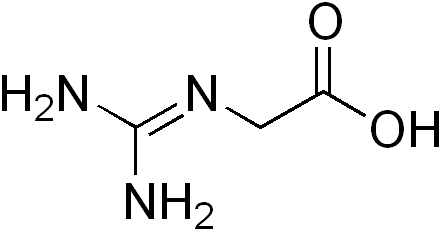Guanidinoacetate methyltransferase deficiency
| Guanidinoacetate methyltransferase deficiency | |
 | |
|---|---|
| Glycocyamine | |
| OMIM | 601240 |
| DiseasesDB | 5461 |
Guanidinoacetate methyltransferase deficiency, also called GAMT deficiency, is an autosomal recessive[1] metabolic disorder that primarily affects the nervous system and muscles. It is the first observed disorder of creatine metabolism.[2]
Presentation
This disorder usually appears in the first few months of life, when development of new motor and cognitive skills becomes delayed or stops. Eventually, affected children may lose previously acquired skills such as head control or the ability to sit unsupported.
Diagnosis
People with guanidinoacetate methyltransferase deficiency have a wide spectrum of neurological symptoms. In addition to mental retardation and muscle weakness, some children with this disorder experience seizures. They may also develop autistic behaviors that affect communication and social interaction. Some affected children exhibit certain involuntary movements such as tremors or facial tics.
Guanidinoacetate methyltransferase deficiency is a very rare disorder. Only a few dozen affected individuals have been reported worldwide. Of these, approximately one third are of Portuguese origin.
Pathophysiology

Mutations in the GAMT gene are associated with guanidinoacetate methyltransferase deficiency. This gene codes for the enzyme guanidinoacetate methyltransferase, which participates in the two-step synthesis of the compound creatine from amino acids glycine, arginine and methionine. Specifically, guanidinoacetate methyltransferase controls the second step of the sequence, in which creatine is produced from another compound called guanidinoacetate.
GAMT gene mutations impair the ability of the guanidinoacetate methyltransferase enzyme to participate in creatine synthesis. Creatine is needed for many tissues in the body to be able to store and use energy properly. The effects of guanidinoacetate methyltransferase deficiency are most severe in organs and tissues that require large amounts of energy, such as the brain and muscles.
This disorder is inherited in an autosomal recessive pattern, which means the defective gene is located on an autosome, and two copies of the gene - one from each parent - are required to inherit the disorder. The parents both carry one copy of the defective gene, but are usually not affected by the disorder.
See also
External links
- National Library of Medicine. Genetics Home Reference - Guanidinoacetate methyltransferase deficiency
References
- ↑ Schulze, A (2003). "Creatine deficiency syndromes". Molecular and cellular biochemistry. 244 (1–2): 143–50. ISSN 0300-8177. PMID 12701824. Unknown parameter
|month=ignored (help) - ↑ Stöckler, S; Isbrandt, D; Hanefeld, F; Schmidt, B; Von, Figura, K (1996). "Guanidinoacetate methyltransferase deficiency: the first inborn error of creatine metabolism in man" (Free full text). American journal of human genetics. 58 (5): 914–22. ISSN 0002-9297. PMC 1914613. PMID 8651275. Unknown parameter
|month=ignored (help)